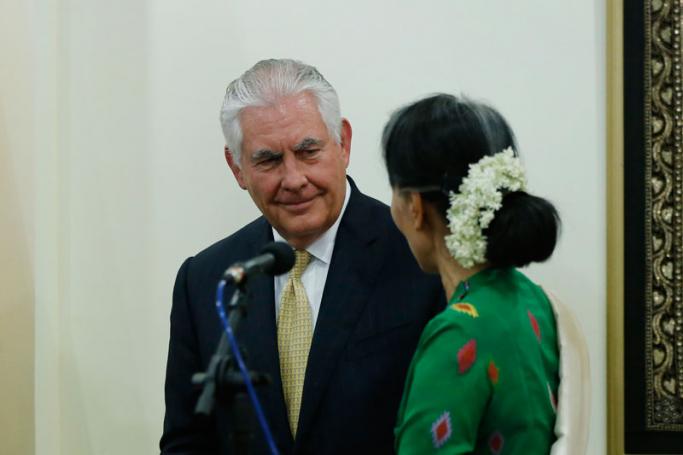The US will not press for sanctions against Myanmar now, Secretary of State Rex Tillerson said at Nay Pyi Taw on Wednesday.
Standing by the side of State Counselor Aung San Suu Kyi after meeting her, Tillerson described proposals for sanctions against Myanmar as 'not advisable' at the moment
U.S. senators in Washington are pressing for economic sanctions and travel restrictions targeting the Myanmar military and its business interests.
However, Tillerson said the United States was "deeply concerned by credible reports of widespread atrocities" in the country's Rakhine state.
"The crisis in Rakhine state is one of the greatest challenges Myanmar has faced since the elected government came into office last year. We are deeply concerned by credible reports of widespread atrocities committed by Myanmar's security forces and by vigilantes who were unrestrained by the security forces during the recent violence in Rakhine state. "
"We are also distressed by the fact that hundreds of thousands of men, women and children have been forced to flee to Bangladesh."
Earlier a senior state department official had told Mizzima that the US would push for the restoration of peace in Rakhine when Secretary of State Rex Tillerson meets State Counselor Aung San Suu Kyi and army chief Senior General Min Aung Hlaing on Wednesday.
He said that 'stabilisation of Northern Rakhine' is a top priority' for Washington and Secretary Tillerson would focus on making that happen during his brief visit to Myanmar.
The official insisted on anonymity.
He claimed that Aung San Suu Kyi had been 'very forthcoming' in her talks with Tillerson and other US officials in Manila, especially on plans for the voluntary repatriation of Rohingyas.
“Both the civilian government and the military will have to work together to solve this problem...Trying to ensure that is most important,” the U.S. official said.
“We are keen to stabilise the northern Rakhine region to facilitate the return of refugees, for which violence there has to stop," the official said. "We want to ensure the military protects all ethnic groups in that conflict zone and conduct credible investigations to punish those responsible for the horrible abuses.”
He said Secretary Tillerson would make it clear to the army chief " the consequences for Myanmar if it failed to respond to the crisis with accountability."
“We do not want to impede Myanmar's progress or reverse its gains in the last few years, but accountability is important for the country's sustained progress," the official added.
U.S. senators are pressing the Trump administration for tough economic sanctions and travel restrictions targeting the Myanmar military and its business interests.
“The secretary will support Myanmar’s democratic transition and urge the government to protect the local population and allow unhindered humanitarian and media access, (and) support for a credible investigation of abuses,” the official said.
Accusations of organised mass rape and other crimes against humanity were levelled at the Myanmar military on Sunday by another senior U.N. official who had toured Rohingya refugee camps in Bangladesh, hours before Rex Tillerson touched down in Myanmar.
Pramila Patten, Special Representative of the U.N. Secretary-General On Sexual Violence In Conflict, said she would raise accusations against the Myanmar military with the International Criminal Court in the Hague.
The military has made public the findings of an internal investigation on the Facebook page of Min Aung Hlaing and circulated a press release detailing its position.
It said it had found no instances where its soldiers had shot and killed Rohingya villagers, raped women or tortured prisoners. It denied that security forces had torched Rohingya villages or used “excessive force”.
U.N. Secretary-General Antonio Guterres and Canadian Prime Minister Justin Trudeau were among those she met in Manila to discuss the Rohingya crisis.
More than 600,000 Rohingya Muslims have fled to Bangladesh since late August, driven out by a counter-insurgency clearance operation of Myanmar forces in Rakhine. A top U.N. official has called the operation a textbook case of “ethnic cleansing”.
Attending an East Asia summit in Manila on Tuesday, Tillerson met Myanmar leader Aung San Suu Kyi, whose less than two-year-old civilian administration shares power with the military and has no control over its generals.
He will meet Suu Kyi again in the Myanmar capital of Naypyitaw on Wednesday, and hold separate talks with the head of the armed forces, Senior General Min Aung Hlaing.
Asked what approach Tillerson would take with Myanmar’s army chief, the State Department official told journalists in a briefing by teleconference that the emphasis would be on restoring peace in Rakhine.
“We are focusing on trying to stabilize areas in northern Rakhine so that people can return there, stopping the violence, making sure that the military would protect all populations in that area equally and that they conduct a credible investigation that leads to accountability for people who have perpetrated abuses,” said the official, who was with Tillerson in Manila and declined to be identified.
The official said the consequences for the country, also known as Burma if it failed to respond to the crisis with accountability could be part of the conversation with the military leader.
“Burma made much progress, and we would not want to see that progress reversed,” the official added.
“The secretary will reiterate support for Burma’s democratic transition and urge the Burmese government to protect the local population and allow unhindered humanitarian and media access, (and) support for a credible investigation of abuses,” the official added.
You are viewing the old site.
Please update your bookmark to https://eng.mizzima.com.
Mizzima Weekly Magazine Issue...
14 December 2023
New UK Burma sanctions welcome...
13 December 2023
Spring Revolution Daily News f...
13 December 2023
Spring Revolution Daily News f...
12 December 2023
Spring Revolution Daily News f...
11 December 2023
Spring Revolution Daily News f...
08 December 2023
Spring Revolution Daily News f...
07 December 2023
Diaspora journalists increasin...
07 December 2023
Koh Tao murder case prisoners see no change in their status on Thai King’s birthday












